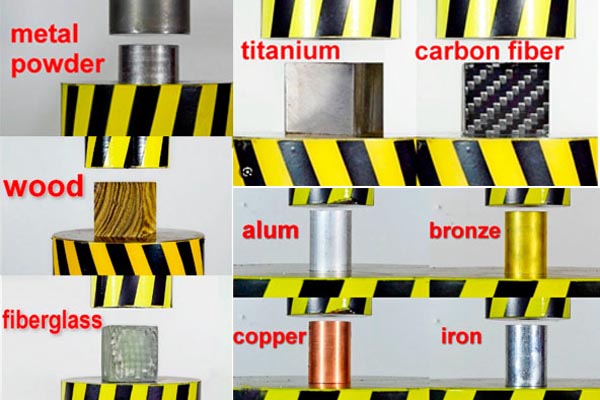What Materials Can be Processed on a Hydraulic Press?
Hydraulic presses are extremely powerful machines that can compress various types of materials. The materials that can be processed on a hydraulic press depend on the specific design and capacity of the machine. Here's a list of common materials that are often processed using hydraulic presses:
○ Metals
Steel: Often used in car manufacturing, metal forming, and stamping.
Aluminum: Common in aerospace and automotive industries for lightweight parts.
Copper: Used in electrical components due to its conductivity.
Brass: For creating musical instruments, fittings, and ammo casings.
Titanium: In aerospace for its high strength-to-weight ratio.
○ Plastics
Thermoplastics: Can be reshaped with heat and pressure.
Thermosetting plastics: Used for creating more permanent molds.
○ Composites
Fiberglass: Used in automotive and aerospace industries.
Carbon fiber: Known for its strength and lightweight properties.
Kevlar: Used for its high tensile strength in bulletproof vests and other protective gear.
○ Ceramics
Porcelain: For electrical insulation and bathroom fixtures.
Silicon nitride: In bearings and cutting tools due to its hardness.
○ Rubber
Natural rubber: For creating gaskets, seals, and hoses.
Synthetic rubber: Common in tires and industrial sealing applications.
Wood and Wood Products
Plywood: Pressing layers together for construction materials.
Particleboard: For furniture and cabinetry.
○ Powders
Metal powders: In powder metallurgy for creating parts with unique properties.
Ceramic powders: For intricate shapes and high-temperature applications.
○ Other Materials
Textiles: Laminating fabrics or forming composites.
Leather: In stamping and embossing for patterning.
Paper products: For forming and cutting operations.
The capacity to process these materials depends on the pressure exerted by the hydraulic press, which can range from a few tons to thousands of tons. Moreover, some materials may require specific press configurations, such as heated platens for plastics and composites, or specialized dies for metal forming. Safety measures must also be considered when processing materials, especially to prevent over-pressurization or machine overload.
Hydraulic presses can process a variety of materials, including metals, plastics, rubber, wood, and composites. Hydraulic presses use the static pressure of a liquid to shape, deform, and configure these materials. If you need hydraulic press, please contact us for your hydraulic press solution.
Delishi Machinery Technology CO.,LTD.
Add: No.3 JinFu Road, Jinma Industrial Park, LiaoBu town, DongGuan City, GuanDong Province, China.
E-mail: Mr. Lee info@goodsjack.com, info@dgdelishi.com;
Web: www.goodsjack.com/ www.dgdelishi.com www.kccnc.com
Tel: +86-769-83061993 / +86-13509801050
Contact: Ms. Eva Lee
E-mail: sales@goodsjack.com
Materials Can be Processed on a Hydraulic Press
○ Metals
Steel: Often used in car manufacturing, metal forming, and stamping.
Aluminum: Common in aerospace and automotive industries for lightweight parts.
Copper: Used in electrical components due to its conductivity.
Brass: For creating musical instruments, fittings, and ammo casings.
Titanium: In aerospace for its high strength-to-weight ratio.
○ Plastics
Thermoplastics: Can be reshaped with heat and pressure.
Thermosetting plastics: Used for creating more permanent molds.
○ Composites
Fiberglass: Used in automotive and aerospace industries.
Carbon fiber: Known for its strength and lightweight properties.
Kevlar: Used for its high tensile strength in bulletproof vests and other protective gear.
○ Ceramics
Porcelain: For electrical insulation and bathroom fixtures.
Silicon nitride: In bearings and cutting tools due to its hardness.
○ Rubber
Natural rubber: For creating gaskets, seals, and hoses.
Synthetic rubber: Common in tires and industrial sealing applications.
Wood and Wood Products
Plywood: Pressing layers together for construction materials.
Particleboard: For furniture and cabinetry.
○ Powders
Metal powders: In powder metallurgy for creating parts with unique properties.
Ceramic powders: For intricate shapes and high-temperature applications.
○ Other Materials
Textiles: Laminating fabrics or forming composites.
Leather: In stamping and embossing for patterning.
Paper products: For forming and cutting operations.
The capacity to process these materials depends on the pressure exerted by the hydraulic press, which can range from a few tons to thousands of tons. Moreover, some materials may require specific press configurations, such as heated platens for plastics and composites, or specialized dies for metal forming. Safety measures must also be considered when processing materials, especially to prevent over-pressurization or machine overload.
Hydraulic presses can process a variety of materials, including metals, plastics, rubber, wood, and composites. Hydraulic presses use the static pressure of a liquid to shape, deform, and configure these materials. If you need hydraulic press, please contact us for your hydraulic press solution.
Delishi Machinery Technology CO.,LTD.
Add: No.3 JinFu Road, Jinma Industrial Park, LiaoBu town, DongGuan City, GuanDong Province, China.
E-mail: Mr. Lee info@goodsjack.com, info@dgdelishi.com;
Web: www.goodsjack.com/ www.dgdelishi.com www.kccnc.com
Tel: +86-769-83061993 / +86-13509801050
Contact: Ms. Eva Lee
E-mail: sales@goodsjack.com

评论
发表评论